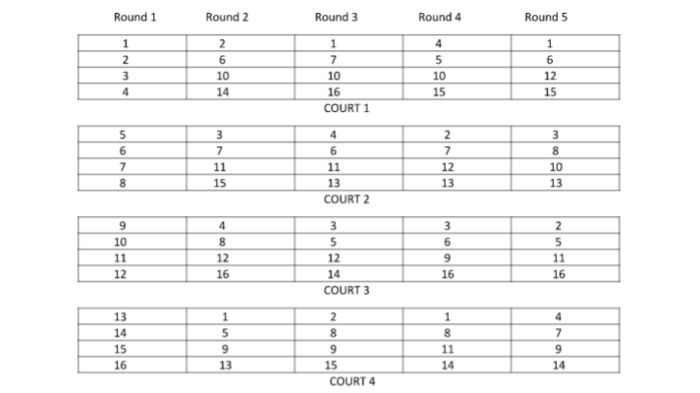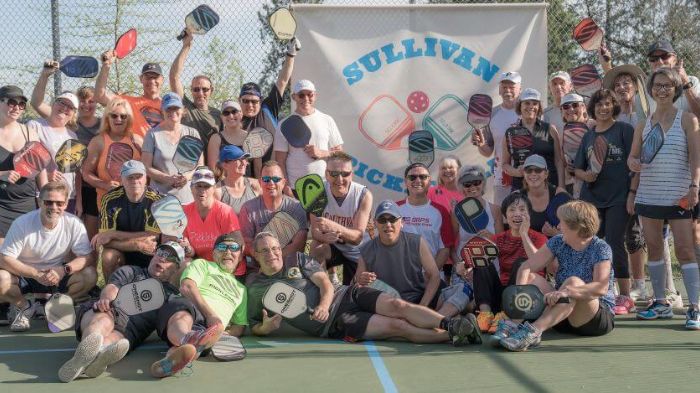Hey there! So you’ve heard about the fun and excitement of playing pickleball, and you’re interested in trying out a round-robin format tournament? Well, you’re in for a treat. Pickleball has become incredibly popular, and participating in a round-robin format can take your game to the next level.
In a round-robin tournament, everyone gets a chance to play against every other participant, ensuring fair and inclusive competition. In this guide, we’ll walk you through the basics of playing pickleball in a round-robin format. We’ll cover different formats, rules, scoring, and the awesome benefits you can expect from participating. Ready?

Let’s jump right in and discover how to have a blast in round-robin pickleball tournaments.
Round Robin Formats In Pickleball
In pickleball, round-robin tournament formats are organized tournament formats that let individuals or teams compete against a variety of opponents in a methodical and inclusive way.
This model guarantees that every player gets the chance to compete against every other player, encouraging fairness and balanced competition. In pickleball and many other sports, round-robin tournaments are frequently employed to provide participants with enough playing time and promote friendly competition.
3 Ways to Format Your Next Pickleball Round Robin
Are you planning your next pickleball round-robin tournament and looking for exciting ways to format it? Well, you’re in the right place. There are three fantastic ways to structure your next round-robin and make it a memorable event.
From club vs. club showdowns to team sign-up tournaments and partner draw formats, each option offers its own unique twist on the round-robin experience.
Get ready to explore these three exciting formats and choose the one that suits your pickleball goals and preferences. Let’s dive in and discover the possibilities for your next pickleball round-robin adventure.
Club vs. Club Round-Robin Tournaments
Round-Robin Club versus Club Pickleball clubs or organizations plan tournaments. Several clubs choose a set number of players or teams to represent them in the competition under this structure. As the competition moves further, participants from each club compete against opponents from other clubs.
Each player or team competes against every other player or team from every other club, and at the conclusion of the tournament, the club with the most victories or points wins.
Team Sign-up Round-Robin Tournaments
Team Registration Round-Robin Individuals are able to create their own teams and register for tournaments. Every team faces off against every other team in a round-robin format. As players cooperate to succeed, this structure promotes brotherhood and teamwork. The winning team is the one with the most victories or points at the conclusion of the competition.
Draw a Partner Round Robin Tournament
Players join up separately for Draw a Partner Round Robin Tournaments, and partners are chosen at random for each match. Participants will have the chance to play alongside and against various opponents thanks to this structure throughout the competition. Each player’s total event rating is based on the points they have earned in the matches.
Different Types of Round Robins
There are several ways to keep the competition exciting in pickleball round-robin competitions. Let’s investigate the many round-robin formats that offer a unique twist on the conventional structure.
These variations offer varied and exciting tournament experiences, from double round robins that maximize playing time to round robins to single-elimination forms that mix the best of both worlds.
Double Round Robins

Every player or team in a double round-robin plays every other player or team twice. This structure increases competition and lessens the influence of chance or luck on the final rankings. Participants can demonstrate their abilities and modify their tactics after learning from their first experiences.
Round Robin To Single-Elimination Format
Round-robin and single-elimination tournament components are combined in the Round Robin to Single-Elimination Format. Players or teams first face off against one another in a round-robin phase of competition.
The top-performing players or teams advance to a single-elimination playoff stage to determine the overall victor based on the results of the round-robin phase. Due to the larger stakes involved in each match during the elimination phase, this structure ups the excitement and intensity of the competition.
Round Robin Rules and Scoring
Prepare to dig into the round-robin pickleball competition rules and scoring structure! The following information can help you ensure a fair and competitive environment:
Play by the Book: Pickleball round-robin tournaments adhere to the established rules. Participants must be familiar with all of the rules, from court dimensions to equipment requirements to gameplay aspects including serving, scoring, and fault laws. By being aware of the rules, you can maintain the game fair and avoid any confusion.
Score Like a Pro: Round-robin competitions may use several scoring systems. In some competitions, games are played up to a predetermined amount of points, such as 11 or 15, using a typical scoring system. Others use a scoring system based on margin, where teams must win by a particular margin, such as 2 points, to claim a victory. You will be able to keep score more properly and plan your strategy more skillfully if you are aware of the scoring system being utilized in your competition.
Effective Time Management: Round-robin tournament match lengths are influenced by variables like the number of competitors, the planned matches, and the allotted time. To make sure that matches are played within the allotted timeframe, it is crucial to be aware of time limits. The tournament will go smoothly and be a fun experience for everyone if time management is effective and gameplay is focused.
Official referees or umpires: In larger competitions, you may have the opportunity to play alongside one of these officials. These game-changers implement the regulations and call lines and settle any conflicts that develop during matches. Respect their choices and act in a fair and sportsmanlike manner at all times during the competition.
Round-robin events place a strong emphasis on sportsmanship and fair play. Respect your rivals, compliment them on nice shoots, and preserve a culture of healthy rivalry. Keep in mind that disputes should be settled amicably and with respect. By practicing excellent sportsmanship, you’ll help create a fun and peaceful atmosphere at the competition.
With these rules and scoring guidelines in mind, you’re ready to dominate the round-robin pickleball tournament while upholding the values of fair play and sportsmanship. Get out there, give it your all, and have a blast on the pickleball court!
Advantages and Disadvantages of Round-Robin Play
| Advantage | Disadvantage |
|---|---|
| Increased Playing Time: Participants get ample playing time, | Time-Intensive: Tournaments can be time-consuming, requiring |
| facing multiple opponents and improving their skills. | participants to allocate a significant portion of their day. |
| Fairness and Balanced Competition: Every participant has an | Fatigue and Physical Demands: Playing multiple matches in a |
| equal opportunity to showcase their skills and compete against | The short period can be physically demanding, leading to fatigue |
| Opponents of different levels, ensuring a level playing field. | Increased risk of injury. |
| Variety and Networking: Round-robin tournaments allow players | The short period can be physically demanding, leading to fatigue |
| To meet and play against a diverse range of players, fostering | The suspense and intensity of single-elimination tournaments, |
| Connections and expanding their pickleball network. | Where each match carries higher stakes and elimination risks. |

Benefits of Round-Robin Play
Round-robin tournaments have some advantages
Increased Playing Time: Round-robin forms make sure that each participant gets to play multiple games against different opponents, which improves and enlivens the experience. The option exists for players to spend more time on the court polishing their abilities and raising their level of play.
Fairness and Balanced Competition: Participants compete against all other participants, providing them an equal chance to showcase their abilities and take on competitors of all skill levels. This system treats all competitors equally, which also reduces the influence of chance or luck on the outcomes.
Networking and diversity: Round-robin competitions give participants the chance to interact with and compete against a variety of opponents. This not only gives the games more diversity, but it also encourages conversation and broadens one’s pickleball network. Within the pickleball community, participants can interact, share strategies, and develop relationships with one another.
Disadvantages of Round Robin Tournaments
Despite their advantages, round-robin tournaments have some disadvantages.
Time-consuming: Depending on the number of competitors and matches, round-robin tournaments may take a lot of time. Participants might need to commit a significant portion of their day, or possibly many days, to the event. It is essential to consider the time commitment required before signing up for a round-robin event.
Playing multiple matches in a short period of time can be physically demanding, especially for older or less seasoned players. Fatigue can affect performance, which increases the risk of harm. Athletes must ensure they have enough rest and recovery time in between games to maintain their energy levels and avoid overexertion.
Lack of Elimination Excitement: Single-elimination tournaments, where each match has bigger stakes and the prospect of elimination adds intensity to the competition, have more suspense and excitement than round-robin models. Some players might prefer the increased tension and excitement that a single-elimination style brings.
Round-robin arrangements are still preferred in pickleball despite these drawbacks since they are welcoming, allow for fair competition, and allow for several matches and exchanges between players. The preferred format should suit the attendees’ tastes and the organizers‘ objectives.
FAQs
A round-robin format in pickleball is a structured tournament format where participants or teams compete against multiple opponents in a systematic and inclusive manner. It ensures that each participant has the opportunity to play against every other participant, promoting fairness and balanced competition.
In a round-robin tournament, participants are divided into groups or brackets. Each participant/team plays against every other participant/team within their group, earning points based on the results. The participant/team with the most points at the end of the tournament is declared the winner.
Matches in a round-robin format are scheduled by organizers, ensuring that each participant/team has an opportunity to play against every other participant/team within their group. The scheduling may vary based on factors such as the number of participants, available time, and court availability.
In most round-robin tournaments, players or teams do not have the ability to choose their opponents. The match-ups are predetermined by the organizers to ensure fairness and equal opportunities for all participants.
Scoring in a round-robin format can vary based on the tournament rules. It may involve playing games up to a certain number of points, such as 11 or 15, or using a margin-based scoring system where teams must win by a specific margin, like 2 points, to secure a victory. The specific scoring method should be communicated to participants before the tournament begins.
Final Thoughts
Hello there, pickleball players! Looking to improve your performance? Playing in a round-robin system is the perfect solution, then. Imagine competing in a series of matches with a variety of opponents and partners that will keep you on your toes. You can choose a number, sign up with a friend, or even engage in a club versus club-competition.
You can customize your experience to meet your preferences because each format has its own flavor. social, competitive, or a combination of the two? You have a choice. Just keep in mind the guidelines and get ready to have fun playing pickleball. Take off.



